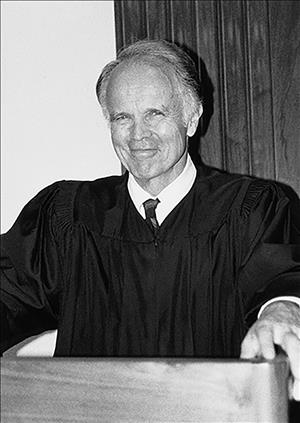On September 6, 1990, Federal District Court Judge William Dwyer (1929-2002) rules in the case of Cunningham v. Municipality of Metropolitan Seattle, 751 F.Supp. 885 (W.D. Wash. 1990) that the federated Metro Council violates the U.S. Constitutional mandate for "one person, one vote." (Some officials sitting on Metro Council represent many fewer voters than others.) He rejects the argument that Metro, which was created in 1958 and expanded in 1972, is a regional utility and not a government. Dwyer gives local officials until April 3, 1992 (later extended by one year), to reorganize the agency and its responsibilities for water quality and transit.
For years, Metro critics had advocated merging the independent agency into King County government. A proposal to do so made the ballot in 1979, but was soundly defeated. However, in 1989, merger supporters got a major boost when the United States Supreme Court ruled in a case involving New York City's Board of Estimate that a board where some elected members represent far fewer constituents than others violates the U.S. Constitution's requirement for "one person, one vote."
Democratic party leaders and County Councilmembers including Ron Sims, Greg Nickels (in 2006, County Executive and Seattle Mayor respectively), and Cynthia Sullivan asked the Washington chapter of the American Civil Liberties Union to investigate whether the Board of Estimate ruling applied to Metro's governing Council, which included elected officials and appointed representatives from King County, major cities, and unincorporated areas.
The ACLU concluded that it did and on October 27, 1989, filed suit in Federal District Court on behalf of four plaintiffs -- Valerie Cunningham, Imogene Pugh, Elizabeth Springer, and Monica Zucker. The case was assigned to Judge William Dwyer, a recent appointee and former ACLU attorney.
Metro argued that the one person, one vote standard should not apply because it was a regional utility, not a formal government. It also argued that its governance structure allowed it to operate efficiently.
On September 6, 1990, Judge Dwyer rejected Metro's arguments, declaring, "that the buses run on time cannot justify a dilution of any citizen's right to vote." He found that the agency exercised the power of a de facto government and had to accord citizens proportionate representation. Dwyer gave local officials until April 3, 1992 (later extended by one year), to find a remedy, or he would mandate his own reforms.
This triggered a long and fractious round of negotiations among Seattle, the suburbs, and county officials. On the second attempt, voters approved King County charter amendments to absorb Metro on November 3, 1992. The agency ceased to exist on January 1, 1994.

